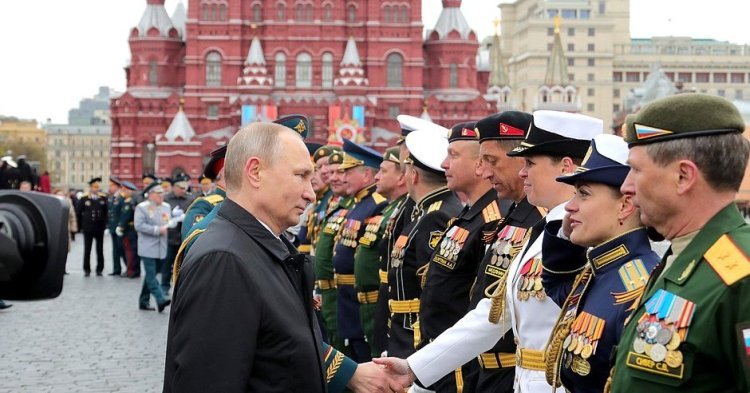Last month’s ‘hard evidence’ of Russia’s hacking of German Chancellor Angela Merkel had the potential to fuel a major diplomatic standoff. But so far it is still unclear whether Berlin would be willing to escalate pressure on the Kremlin. Last December’s daylight murder of a former commander of Chechen separatists at Berlin allegedly orchestrated by the Russian intelligence could have echoed the tense aftermath of the poisoning of Sergey Skripal in London, but ultimately receded.
It might appear that too many people across the EU have given up their attempts to change Russia’s behavior by imposing new punitive measures. Once labeled as a regional player and spoiler that should be isolated by the Obama administration, the former U.S. President might have been right in describing Russia’s geopolitical role. But it turned out that sanctions haven’t been able to push Moscow to recalibrate its behavior either domestically or abroad.
In March, President Vladimir Putin told TASS news agency that, according to some estimates, the country had lost as much as $50bn because of foreign sanctions. The number, however, may be at least four times higher, according to Bloomberg. But even that amount does not seem to be enough to propel changes.
Last February, Russia’s business community was shocked by the arrest of Michael Calvey, the founder of a major private equity fund in the country Baring Vostok. The arrest of the top foreign investor allegedly over a commercial conflict with the Kremlin-linked Artem Avetisyan, and triggered an international backlash. The U.S. ambassador to Russia, Jon Huntsman, announced a boycott of another flagship investor forum in St Petersburg and, a few months later, Putin and French President Emmanuel Macron held talks that influenced a Russian court’s decision to put another Baring Vostok executive Phillipe Delpal under house arrest.
Although the unprecedented decision might have put another nail into the coffin of Russia’s already grim investment climate and sluggish economic growth, Calvey is still just one of the tens of thousands of businessmen that have been arrested since the annexation of Crimea. For instance, in 2018, Russian courts charged more than 7,700 businessmen, 20% more than a year earlier and almost twice as many as in 2014. If anything, Russia’s current regime only became more repressive domestically during the past six years.
The COVID-19 quarantine measures have severely disrupted the Russian economy, and it might take at least two to three years to regain the pre-pandemic levels. The scale of damage has alerted even the highest echelons of power. During the G20 video-summit on March 26, Putin unexpectedly proposed a moratorium on sanctions related to essential goods, and a few days later Russia unsuccessfully attempted to put forward a proposal on easing sanctions at the UN. Nonetheless, economic hurdles don’t seem to be enough to sway Russia’s foreign policy, even when the oil prices hit the negative zone.
The most recent venture in Libya had been clearly planned during the past months despite the pressure of domestic economic decline and the collapse of the OPEC+ deal. In effect, this may ultimately indicate the Kremlin’s power to influence migrant flows and directly impact the politics of Southern Europe. It likewise shows that there are few factors that could push Moscow to embrace a more constructive global role.
Its geographic proximity and substantial trade turnout make Russia a troublesome neighbor for the EU. During the past few years the relationship between Moscow and the EU has cooled off, as mutual alienation has set in. Furthermore, Brussels now seems confused about what to do with Moscow, while also being caught in the middle of the evolving confrontation between the Trump-led U.S. (which seems both chaotic and unpredictable) and an increasingly self-assertive authoritarian China.
Although the EU might eventually proceed with the new wave of sanctions in response to the hacking accusation, it is likely that at the end of the day it will strive to maintain the status quo. Brussels is not interested in escalating pressure, and nurtures no illusions about more responsible behavior on the part of its estranged neighbor in the foreseeable future.
During a video conference at the Konrad-Adenauer-Stiftung (KAS) foundation, the think tank connected to the centre-right Christian Democratic Union (CDU), with political group leaders from the European Parliament, Merkel spent very little time discussing Russia and stated that the EU merely seeks to maintain a “peaceful coexistence”. She likewise added that Russia should itself be interested in constructive relationships with the EU.
The statement reflects both the EU’s utterly pragmatic and disillusioned vision of the current state of affairs, and the cautious hopes of avoiding any new slumps for as long as possible.
Berlin will be assuming the presidency in the Council of the European Union in July and will be setting the political agenda for the next six months. The fact that Germany’s energy regulator recently refused to grant a waiver for EU gas directives to the operators of the Nord Stream 2 pipeline likewise indicates that Berlin is eager to cement a more united position on Russia.
In other words, Merkel might have stated the consensus of the political elites who have lost any hope for an improved relationship with Russia. In the near future, Russia might also no longer be treated as a foreign policy priority or as an imminent threat, as it was even a few years ago, but as an estranged and problematic neighbor.


Suivre les commentaires : |
|
